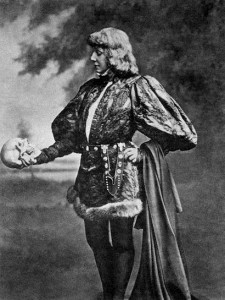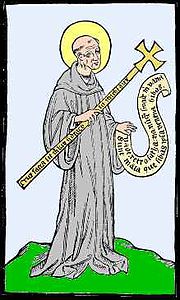Towards the end of Shakespeare’s ‘Hamlet’ there are two quite touching lines which describe the death of Hamlet, Prince of Denmark. They are spoken by his friend Horatio:
“Now cracks a noble heart. Goodnight sweet prince,
And flights of angels sing thee to thy rest!”
(Hamlet Act V, Sc. II)
 |
Sarah Bernhardt as Hamlet – 1887
They remind me very much of the words of ‘In Paradisum’, a quite beautiful and touching ancient anthem that we recite at the end of a Requiem Mass, usually, as the body of the deceased is being taken from church to his or her place of rest:
“May angels lead you into Paradise;
may the martyrs receive you at your coming
and lead you to the holy city of Jerusalem.
May a choir of angels receive you,
and with Lazarus, who once was poor,
may you have eternal rest.”
By now we are well into November, the month of All Saints and of All Souls. It is the month when, traditionally, we remember all those who have died, and gone before us to their place of rest, and in this, I refer to all those who have died in war, and in many other ways, together with our own relatives and friends.
The Book of Wisdom makes the point that there is just one way to enter into this world – and only one way to leave it – and it is as well that we remember this throughout our lives.
We remember the dead in our prayers, for it is not given to everyone to live such a life of holiness as to be able to expect that, once life is finished for them on earth, they should be welcomed into heaven, without a stay in Purgatory. It is not necessary that we should pray for those who have achieved their goal – paradise for all eternity – as they are the saints who pray for us. However, “it is a holy and wholesome thing to pray for the dead, that they may be released from their sins,” and so we pray for all those others who suffer some period of separation from God, before being united with him in heaven.
Father Jonathan, who follows the activities of Pope Francis assiduously, adds a rider at this point – a rider in the words of His Holiness, on the subject of sinning, repentance and forgiveness:
In St. John’s first letter chapter one verse eight we read: “If we claim to be without sin, we deceive ourselves and the truth is not in us”. Pope Francis asks a good question on this point: ”But what is the difference between sin and scandal?” The difference, he said, is that “whoever sins and repents asks for forgiveness, he feels weak, he sees himself as a child of God, and he humbles himself and asks Jesus to save him. But the one who gives scandal does not repent and continues to sin and pretends to be a Christian”. It is as though he leads “a double life,” and he added, “The double life of a Christian causes great harm … it is hypocrisy”. (Sermon at Santa Marta, 11 November 2013). We need to make sure we are humble children of God and not corrupt sinners who defy God.
 |
Some time ago, I remember sitting quietly, at home alone, and without the often disturbing company of the television, and it was then that I was arrested by the thought of that walk along ‘Sunset Lane’. Perhaps the name will ‘give the game’ away, but Sunset Lane is inevitably a ‘One Way Street’; there is no carriageway in the returning direction. And, there is one further restriction on travel along this road, for one must travel along it alone. People travel along it every day – many times in their thousands – but, essentially, they travel this road as individuals, one person, one heart, one spirit.
Men, women and children, of all ages, from all sorts of stations in life, young and old, rich and poor – it makes no difference once they are on this road – all heading in just one direction. And, they only ever travel this way once in their lives. There may be many times when a person may think he has reached Sunset Lane, but then at the last minute, he finds that he was on a different route and not actually on the Lane as first thought.
Where does it lead? Who waits for us? What future is there when we get to the end of the Lane? No one really knows and though many travel this way trusting and believing that they know who, and what, is waiting, they do so in faith alone, for no one knows for certain. Unfortunately, many travel this lonely road without caring, with complete disregard and utter contempt – throughout all of their lives – refusing to believe they would ever meet anyone at the end of this Lane. I shudder at the thought of the fate that may be awaiting some of these – and pray for them – for some saving grace that may help them.
Now, readers of this short blog may be starting to think that they could have been reading something not quite so dark – not quite so depressing – and I can readily understand their feelings. It is not easy for one to ‘dig a little of his own grave’ every day, though different orders of monks – Christian and many others, have been recorded over hundreds of years as doing just that, and St. Benedict, the father of monasticism in Europe, foretold his own death by six days, and instructed his monks, secretly, to dig his grave. On the sixth day, Benedict fell ill, died, and was buried there.
 |
St. Benedict with Cross and Rule
On Ash Wednesday we are told to ‘remember that thou art but ash and unto ash thou must return’, and so, within our faith(s), we are reminded frequently that life on this earth will come to an end, one day, and there is nothing we can do about it. Even Jesus and Mary, His Mother, had to face death. So, what can we do in the face of that walk along ‘Sunset Lane’?
Physically, we can do nothing, but mentally, we can prepare – and the saving graces in all of this are faith, hope and trust in God’s goodness. When created, God never intended that we should have to face death. He created us to live – and it was only through envy and pride that mankind was tempted to challenge God’s power. Human kind has faced death ever since, and the Book of Creation explains and tells us why. But, in being expelled from that perfect life in ‘The Garden’, God made us a promise – to give us Mary, who would crush the serpent’s head under her heel – by being mother to God’s Son – our redeemer, and the only one able to save the human race from utter devastation.
That Redeemer came, lived and showed us how to live, then suffered and died for the sins we men, and women, have committed, will commit. He rose from the dead, thus proving his divinity, and God’s favour for all humanity. Therein lies our source of hope – and we must never forget it. If we believe in God’s goodness, and in his favour, we shall die – yes – but then live for all eternity, in God’s goodness and majesty.
It seems there may be ‘light at the end of the tunnel’, after all.
Socius
